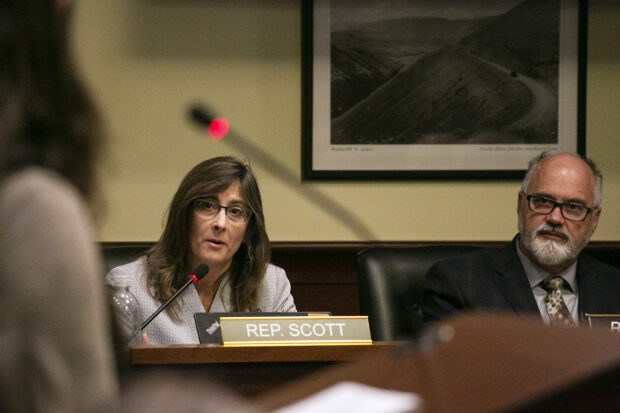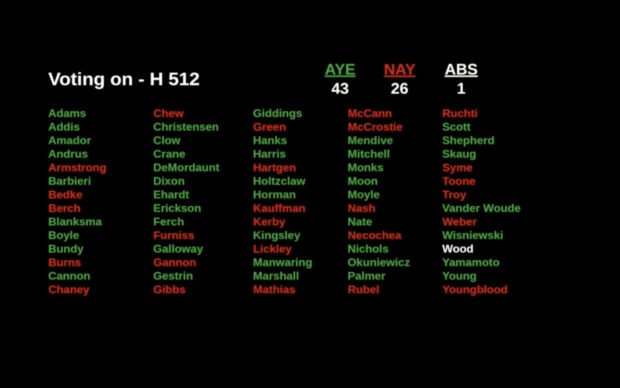The House Thursday voted to prevent local taxing districts from requesting a bond from property taxpayers more than once in 11 months.
That would mean school districts, which use bonds to pay for new facilities, would effectively have to wait a year to try again if they miss the two-thirds voter support they need to get bonds passed.
As partisan debate centered on school bonds, Rep. Heather Scott deflected charges that House Bill 512 was meant to single out schools. The bill targets “aggressive taxing districts,” she again said Thursday.
“This is designed just to go after bad actors,” said Scott. Taxing districts “just keep rerunning (bonds) until they get the answer that they want.”

Rep. Sally Toone, D-Gooding, countered, “This is aimed mostly at our schools … We know that.”
“What if we have an old building, a dilapidated one, or we need to build one because of growth? Bonds are the only tool that we have to solve that problem,” the career teacher said, citing a recent report pointing to Idaho’s deteriorating school buildings.
Another report found Idaho will have to build 104 new schools by 2030 to keep pace with growth, as EdNews reported.
The Idaho School Boards Association opposes the bill, and it received mixed reviews from public testifiers in committee last week and from lawmakers Thursday.
Idaho schools can run bond and levy elections on any of the state’s four election dates in March, May, August and November, regardless of recent rejected requests.
Scott, R-Blanchard, sponsored the effort for the third time in five years.
Her bill wouldn’t mandate a cooling-off period for levy requests, including plant facilities levies that fund building repairs.
HB 512 passed 43-26, with all Democrats and 14 Republicans opposing it.

It now heads to the Senate, where similar proposals have stalled in 2018 and 2020. Retiring Senate State Affairs Committee chair Patti Anne Lodge, R-Huston, has set the committee’s agenda since 2019.
Charter building fund. The House also voted to establish a revolving loan fund for charter schools, which would provide zero-interest loans for new buildings.
Charter schools could borrow up to $2.5 million and would have to pay it back over five years.
Currently, charters have to pay high interest rates for new school buildings, and sponsor Rep. Julie Yamamoto, R-Caldwell, said that costs taxpayers and blocks young charters from putting up new facilities.
They also can’t bond for new buildings as traditional schools can.
Only Rep. Steve Berch, D-Boise, opposed House Bill 545, as he did in committee, after no debate.
‘Divisive teachings’ and the ‘fattest president’
Republican lawmakers continued legislating against alleged classroom indoctrination.
The Senate Education Committee passed a non-binding resolution on party lines that would decry “critical race theory” and “divisive content … appearing in school curriculum across the nation” that “seeks to disregard the history of the United States and the nation’s journey to becoming a pillar of freedom in the world.”
Elaine King, who sat on Lt. Gov. Janice McGeachin’s anti-indoctrination task force over the summer, testified that Senate Concurrent Resolution 118 reflects “concerns of many parents about the lack of American history being taught in our schools.”
King, representing a pro-school choice parent group from Idaho Falls, claimed K-3 students are first exposed to American history through books about Martin Luther King Jr. and Rosa Parks, and said books about slavery and civil rights are assigned with “no foundation of … our country’s beginning.”
And she took issue with another book that she said teaches “about how you don’t have to eat broccoli if you’re the president. You can bowl in a bowling alley if you’re the president. And then it talks about all the strange things that past presidents did, and who the fattest president was. That was the essence of that book. These books aren’t bad, but they are our children’s first exposure to our history.”
Democrats David Nelson of Moscow and Janie Ward-Engelking of Boise said they agreed with a line of the resolution saying the Legislature encourages schools “to provide children with the knowledge, strength, and virtue of a free people by viewing the history both clearly and wholly, not only the offenses but also the triumphs.” But they pushed back on wording that decries “divisive teachings.”
“I know how hard we work to be non-political and non-biased, and to present all sides of an argument … and to allow children to do research on their own,” said Ward-Engelking, a retired teacher. “Sometimes funny things are used to spur a student’s curiosity — maybe about a president — but certainly, that’s not the essence of what we teach. And I’m worried that this resolution seems to indicate that these things are happening in the classroom — that we’re teaching divisive content, that we’re not giving the whole picture.”
Ward-Engelking said Idaho schools don’t have the issues the resolution describes, and asked sponsor Carl Crabtree, R-Grangeville, why legislation is needed.
“It’s a very good question,” Crabtree said. “But I think the intent here is to look at, I wanna say global perspective. But I think there is a belief by some around the nation that these kinds of things are happening, and there’s certainly a difference of opinions on where they’re happening. We’ve dealt with some of those within the Idaho Legislature. I think … the idea is to call attention to it rather than to criticize anybody or ostracize anybody.”
The state already has a “non-discrimination” law that targets critical race theory, but doesn’t ban the teaching of the academic lens for viewing racism’s impact on institutions.
SCR 118 now heads to the Senate floor.
‘Harmful materials.’ Rep. Ron Nate, who has vocally pushed against alleged school indoctrination, brought a seemingly related bill forward in the House State Affairs Committee.
The bill would “(remove) an exemption for schools, universities, museums and libraries from the distribution of harmful materials to children,” Nate, R-Rexburg, told the committee. “There’s a great case to be made on this and I would appreciate the opportunity to bring it to a hearing so we can hash this whole thing out.”
The committee introduced the proposal with no debate. It can now receive a full hearing and vote.
Busing contracts
Currently, school districts can’t sign contracts for student transportation that run longer than five years. Senate Education unanimously passed a bill to change that.
Senate Bill 1319 would raise that cap to 10 years if the contract is paid for by a new federal clean school bus program, established by the sweeping infrastructure law passed by Congress last year.
Conservation Voters for Idaho backed it in testimony Thursday. The bill goes to the Senate floor.
